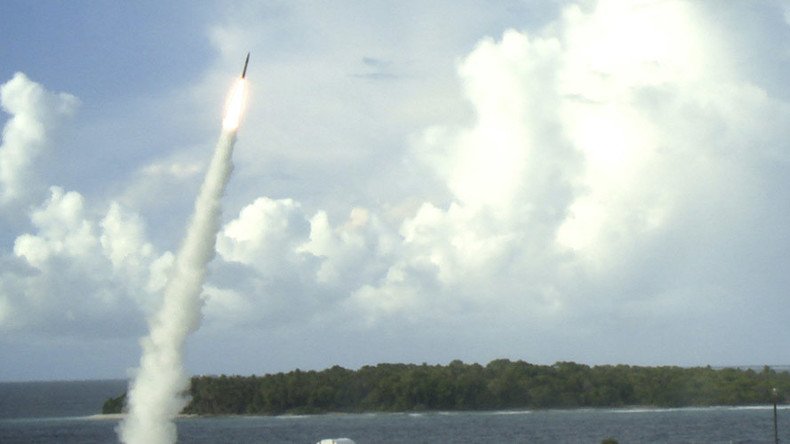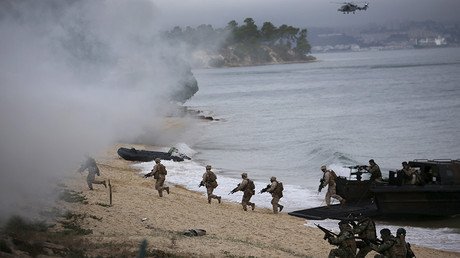BBC whips up anti-Russia hysteria to apocalyptic levels

Once again, Russia is being featured as Dr. Evil Incarnate, the villain that regularly plays opposite peace-loving NATO nations, in a BBC program that has Moscow initiating an invasion on Latvia followed up with a nuclear strike on Britain.
And just in time for the military-industrial shopping season.
Since the collapse of the Soviet Union, Russia has failed Western analysts and political pundits in spectacular fashion. Despite a full-court effort to portray Russia as a barbaric, land-grabbing nation obsessed with the idea of restoring imperial real estate, Russia has stubbornly refused to play along.
Why, even dangling the fat bait of Ukraine before Russia's nose could not get Moscow to react the way NATO had hoped it would.
In fact, while NATO has been hot on the warpath against a number of shell-shocked nations across the Middle East, Central Asia and North Africa, Russia has gone to war on just one (1) occasion, and that was against Georgia, and only after the egomaniacal leader of that tiny Caucasian country tempted fate by stupidly poking the Russian bear first.
Thus, the BBC has apparently found it necessary to contrive an altered state of reality, a veritable twilight zone, to convince its audience of Russia’s ‘real’ intentions: The result is a military contractor’s wet dream, an apocalyptic bunker buster, unsubtly entitled ‘World War Three: Inside the War Room,’ that depicts a sweat-inducing showdown between Russia and NATO and the beginning of WWIII.
It's probably safe to say I would not be playing plot spoiler by revealing here that Russia has been typecast as the aggressor.
Watched BBC2 World War 3: Inside the War Room, while scenario of separatists in Latgale is rubbish, overall many lessons to learn for all
— Edgars Rinkēvičs (@edgarsrinkevics) February 3, 2016
To briefly summarize: After the Russian military rolls over little Latvia for no good strategic reason whatsoever, British military commanders and graying bureaucrats with furrowed brows huddle themselves in a bunker, deciding whether to launch Trident missiles at Russia in response.
The Daily Mail breathlessly described the tax-payer paid performance as “an utterly realistic 'war game'” which presents “deeply troubling questions, not least with the current political row over Government plans to spend £100 billion replacing our fleet of Trident submarines.”
Eureka! At the very same time UK military contractors are salivating over the prospect of winning billion-dollar contracts to replace the Queen’s collection of Trident nuclear-armed submarines, along comes a state-funded scaremongering film, starring arch-villain Russia to lend some credence to the initiative.
Russian lawmaker Frants Klintsevich told the Russian News Service radio station the film will give NATO an opportunity to remind member states that they should crack open their tattered purses and boost their military spending.
"They [West] have always demonized Russia trying to show that it is uncontrolled and non-European. As for what happens recently… we qualified this a long time ago as an information war, a very serious and a profound one," said Klintsevich, the first deputy chairman of Federation Council’s committee on defense and security.
"Today the US has a very serious problem of rearmament, the military and industrial sector needs to get financing. A mechanism of the corrupt American elite has been launched. This was in Iraq, is in Syria and around Europe," the senator said.
Meanwhile, the Kremlin has provided a tongue-in-cheek critique of the BBC film.
"Unfortunately, our colleagues from the BBC have lately resorted to making public products, of quite low-quality. Therefore, we haven't always been in a hurry to familiarize ourselves with them," Russian presidential press secretary Dmitry Peskov told reporters when asked whether the Kremlin has stayed up late to catch the film.
"It's simply not worth the time it takes to watch," Peskov said.
On the same day the BBC thriller was released, a report by the totally unbiased Rand Corporation – invoking sexed-up memories of Saddam Hussein’s alleged ability to strike the UK in 45 minutes - said that it would take just 60 hours for Russia to occupy Estonia and Latvia, and that's not taking into account Riga's rush-hour traffic.
"Across multiple games using a wide range of expert participants in and out of uniform playing both sides, the longest it has taken Russian forces to reach the outskirts of the Estonian and/or Latvian capitals of Tallinn and Riga, respectively, is 60 hours," Rand said in its report.
Today in Geek History: Dr. Strangelove or: How I Learned to Stop Worrying and Love the Bomb premiered in 1964. pic.twitter.com/Gqp1WIHhYr
— ThinkGeek (@thinkgeek) January 29, 2016
"Such a rapid defeat would leave NATO with a limited number of options, all bad."
It might be worth noting in closing that former RAND chief strategist, Herman Kahn, once forwarded the insane idea of a "winnable" nuclear exchange in his 1960 book ‘On Thermonuclear War.’
This led to Kahn being the inspiration for the title character of Stanley Kubrick's black comedy satire Dr. Strangelove.
As far as the BBC's latest anti-Russia production goes, well, it's just plain strange.
The statements, views and opinions expressed in this column are solely those of the author and do not necessarily represent those of RT.














